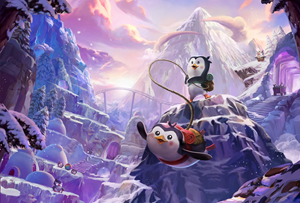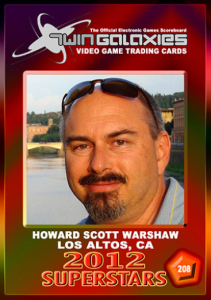Baseball has long been America’s pastime, but after the steroid scandal of the late ’90s, the illegal antics off the field absolutely were paramount to the drama that occurred during games. While the personalities of the game have always been important to fans, players were bigger and stronger and more animated than ever before. Make no mistake, by 2002, the quiet and passionate determination of players the likes of Hank Aaron were permanently silenced by the sheer charisma of Sammy Sosa and badassery of Barry Bonds. By the 2000s, baseball felt like a different sport entirely to hardcore fans.
While many video game publishers refused to acknowledge such a change, arcade-inspired baseball games have existed in the past, even before the steroid era. Titles the likes of Baseball Stars, Clutch Hitter and Super Baseball 2020 all hit the fun factor out of the park at points, but arcade giant Midway, known for the NBA Jam and NFL Blitz series, nailed it with MLB Slugfest 20-03, which ironically appeared only on home consoles. With real players, stadiums, over the top commentary and an intuitive turbo system that took a page from their previous classics, the original Slugfest was a combined million seller on the PlayStation 2, Xbox and Gamecube and earned three sequels. While far from the gameplay innovator of titles like Konami’s Bottom of the Ninth and Sony’s The Show, it’s easily one of the most enjoyable arcade baseball experiences to ever appear on a home console.
But by all estimations, MLB Slugfest 20-03 should have been an arcade game as well. Producer Mark Flitman, who was assigned to the project after his work on NFL Blitz 20-02, saw the game as one that symbolized the change of the company’s approach to the market. While Midway was the king of the arcades for a lengthy period of time in the ‘90s, thanks to games such as Mortal Combat and NBA Jam, times were a changing. It was up to Flitman, who had a lengthy resume of successful titles with Acclaim, to make sure the team, who largely developed for the arcade, made the transition needed to create a successful console game. “I love a challenge and I had never done a baseball game before,” Flitman said. “When I started at Midway, the game was in early stages of development and it was also expected to be for the arcade. Unfortunately, shortly after I started at Midway, all arcade development was terminated.”
It certainly helped that Flitman had been a long-time fan of the sport. Growing up in Chicago, the memories were plenty. And with no prior baseball game on his resume, Flitman, who previously served as producer on several WWF and Marvel Comic-based games at Acclaim, was essentially fulfilling a life-long dream of being a part of a baseball game. “When I was a kid, we were all baseball fans. In Chicago, you had to decide if you were going to be a Cubs fan or a White Sox fan. It seems like yesterday that I would take the El train to Wrigley Field and watch the Cubs,” Flitman said. “I remember one specific outing where a friend and I went to the game and bought the scorecards so we could keep score as the game progressed. The game was delayed due to rain. We sat in the seats for about two hours and finally decided to go home. When I got home an hour later, the sun came out and the game was back on. I kept score at home watching the rest of the game on WGN channel 9. I was very unhappy.
“Another baseball memory was ‘lagging.’ Every school day at recess, we would take our pile of baseball cards outside and find a wall. You and your opponent would lag cards. This involved tossing a card against the wall and taking turns until one of you got a card to land on top of a previously thrown card. When that happened, you got to keep all the cards that had been tossed. It was basically gambling for grade school kids. All my old baseball cards have bent corners and
scratches.”
Wear and tear on baseball cards was to be expected from kids, but at Midway, video game development was serious business. Flitman knew that all too well. Managing a team that consisted of industry legends Sal DiVita, Mark Turmell and veteran Jamie Rivett, who later programmed WWE All Stars, TNA iMPACT! and NBA Ballers and the pressure to create something special was always apparent. “Slugfest was one of the most difficult developments I had worked on, but not because of problems,” Flitman said. “It was due to the team’s talent and their quest for perfection. The baseball players had to look as good as possible. Every detail in a stadium had to be shown. That’s a lot of players and a lot of stadiums. Motion capture had to be the best possible. Gameplay balance had to be tested over and over to be just right. That’s just the visual elements! This game was also a groundbreaker in audio use because I believe it was one of the first games to have humorous audio banter during loading times.”
With reigning All-Star, Gold Glover and Silver Slugger Alex Rodriguez on the cover, the original Slugfest had what many players wanted from the start, but the game wasn’t one to be judged by its cover alone. According to Flitman, the special parts of Slugfest were under the hood. “We had a few local baseball players in the motion capture studio to get some footage on stances, swings, etc. I don’t even remember Alex Rodriguez coming into the office,” Flitman said. “I think he was minimally involved if at all. Most of the fun stories happened in the audio recording sessions. I did make numerous trips to NYC to get approvals and reference materials from the MLB and the MLBPA. I loved my trips to New York and I had good relationships with both licensors. My contact at the MLBPA actually worked with me at Acclaim before he went to the MLBPA so we had a history.”
With many of the small details that could bog down some producers taken care of, Flitman was able to play a larger role in the game than he did in his previous work on the Blitz series. That meant helping shape the audio presentation. Ask anyone that’s played MLB Slugfest 20-03 and they’ll tell you, the commentary is what makes the game truly stand out. Although a quality baseball game on its own merits, it’s hard to put that “wild” Midway flair on a game as tame as baseball. While the addition of turbo influenced gameplay tremendously, it was still a baseball game. What made Slugfest undeniably “Midway,” was the game’s play-by-play and color commentary.
“Even though I was the producer on the title and was involved in the full development cycle, I am personally most proud of the audio banter between the two commentators,” Flitman said. “We had an idea to have two commentators talk during loading screens. We wanted a straight man and a partner that was, how do I say this with style, ‘nuts.’ There were some local talents on the radio that had silly sports personalities. I had a few in mind and contacted them. I held some auditions and we got very lucky with Kevin Matthews and his Jimmy Shorts character. Tim Kitzrow did the audio for NBA Jam and was the perfect straight man. What we did was schedule a number of recording sessions over a few months and I would spend time coming up with lists of unusual situations. At the session, I would tell the guys the situation and they would improv. For instance, I remember in 2002 LA had a ‘Rally Monkey’ that they would show on the big screen during the playoffs and it would inspire the fans and the team. So, I said that Jimmy should bring a ‘Pennant Pig’ into the booth and let it out of the cage causing havoc. Or Jimmy should leave his bag of peanuts by the window of the booth which would accidentally cause unsuspecting birds to fly into the window.
“One of my favorites was Jimmy not being in the booth a few minutes before game time and when he called Tim to tell him he was going to be late due to a traffic jam, you could hear him ordering food at a drive-thru. I would walk around with a small pad of paper in my pocket and whenever an idea struck me I would jot it down. Everyone contributed ideas, but I was very much into the comedy and the characters. I loved writing humorous situations and have these talented guys go crazy. Growing up in Chicago and hearing Harry Caray announce the Cub games was definitely an influence. He would go off on tangents that had nothing to do with the game but were unintentionally hilarious.”
While the audio shined as one of the coolest parts of the game, Flitman was instrumental in adding something else he feels was a hidden treasure. “Everyone knows that most Midway titles had hidden characters, but for me, Slugfest was different,” Flitman said. “I was friends with (Spawn comic producer) Terry Fitzgerald and (creator) Todd McFarlane. When I was working at Acclaim, Spawn comics were just getting started and we thought it might make a good game, so I visited Todd at a comic book signing at Nassau Coliseum in NY. We exchanged numbers and developed a relationship. I knew Todd was a big baseball fan and asked him if he and Terry wanted to be hidden characters in Slugfest. They were ecstatic. I took a trip to Arizona and got pictures of them for the team to create the graphics. During one Todd interview, he even played Slugfest just to show how he was the whole team in the hidden mode.”
Away from adding those cool extras that were signature to a Midway Sports title, such as unique hidden characters, the development of Slugfest was far from straight ahead at times. More accustomed to developing games for the arcade, Flitman said the team fought itself with a penchant to make things perfect, which made it tougher to do the most important thing in console development- get a game out on time. That, coupled with some “nasty” bugs towards the end of development made the fun seem more like business at times, Nevertheless, Flitman believes the time spent on the Slugfest series was important to his future development as a Producer. Serving as a writer and producer on Slugfest 20-04, the original Slugfest definitely allowed Flitman to exhibit his versatility. “Working on Slugfest made me a much stronger producer because of the strong opinions of some very talented people,” Flitman said. “Everyone was dedicated to this game and would do anything to achieving our goals. We had countless all-nighters. Due to the unique personalities, we would also have clashes and at times things could get a little heated —‘He’s on fire!’ There were many times that I had to make peace or make decisions that did not make everyone happy and definitely did not make me the most popular person in the room. I quickly learned that you can’t make everyone happy all the time.”
That being said, Slugfest was definitely a learning experience, but after his work on Blitz 20-02, Flitman was no longer the “new guy.” On Slugfest, Flitman was more involved than he ever was before at Midway. That, if anything else, made the game a far different experience for him. Flitman, who also was a producer at Hasbro Studios, has plenty of things he can hang his hat on and Slugfest is one of his most cherished experiences of his game career. “The games shared common themes of sports and over the top elements, but I enjoyed Slugfest a little more because Blitz got me familiar with Midway, the personalities, the work habits and their style of gameplay, but Slugfest was original and Blitz was a follow-up,” Flitman said. “I loved getting involved on the ground floor. How does it feel to know that this game is still appreciated after so long? It’s always great to know that a game has legs and can hold up over time, the problem for me is that I never really know. I have no idea if anyone is still playing with any titles I produced or any toys I made. I’m always surprised when someone tells me that they enjoyed something I was involved with when they were younger. Not that I don’t think what I did was good, but that it was actually a memory that they hung on to is fantastic.”
If anything, Slugfest, without a doubt, created more memories than Midway’s sports titles the year before. Even if it wasn’t initially put in a situation to. Like NFL Blitz 20-02, MLB Slugfest 20-03 was also released late, hitting the PlayStation 2, Xbox and GameCube on June 23, 2002, a good three months after the start of Spring Training, when most baseball games come to market. However, unlike Blitz 20-02, which suffered in sales due to its tardiness, Slugfest ended up with over a million combined units in sales. Luckily, all the extra time in development to create a game with a real sense of identity, something different from the offerings of Sega and Electronic Arts at the time, was apparent to gamers.
“The game is special because of the extreme dedication that the whole team gave it. Everybody was involved 100 percent,” Flitman said. “I believe it was the first over the top baseball game and I know that the comedy audio was very special for the players that discovered it. We included a lot of audio and a lot of variety. After loading the game a few times, a player would realize that the audio was different and the characters really had personalities.”
That attention to detail is what Flitman believes truly sets the game apart. So much so that Flitman saw a missed opportunity at Midway to take over the baseball genre entirely. “Slugfest was a great looking, fun baseball game with the usual Midway over the top elements,” Flitman said. “In fact, the game looked so good, in hindsight we probably should have made Slugfest and then made another totally realistic baseball game without the over the top gameplay elements. I bet both titles would have been a hit.”
The post MLB Slugfest 20-03: No Arcade? No Problem appeared first on Old School Gamer Magazine.



